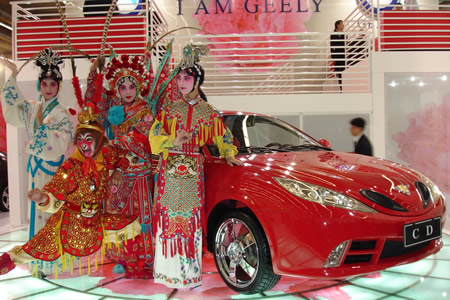Geely will start assembling cars at the end of this year with a local partner
in Malaysia to begin sales of vehicles throughout Southeast Asia. Initial annual
production will be 10,000 units.
Li says Geely will directly export its cars to the United States and Europe,
in order to take advantage of low tariffs from the beginning. He will not
provide a time frame, however.

Performers of the
Chinese traditional Beijing Opera pose in front of a Geely sports car
during the 61st International Car Show in Frankfurt, Germany, September
13, 2005. China's first private car maker Geely was the only one being
invited to the show among China's home-grown brands. The show ended on
September 25, 2005. [sina.com]
|
"We will
also consider building plants in the United States and Europe if we faced
anti-dumping charges and increased tariffs," he adds.
Chinese-made textiles and home appliances have faced a long list of
anti-dumping charges over the past several years in the United States and Europe
because of rising protectionism.
Li says Geely will build thousands of sales and service outlets throughout
the world by 2015, mainly by employing local people. The company currently has
more than 100 stores overseas.
Li is not alone in his determination to conquer the West. Other Chinese
vehicle producers are also on the move.
Chery Automobile, in East China's Anhui Province, will begin exporting cars
to the United States in 2007 through Visionary Vehicle, a US-based auto trader.
Jiangling Motor, Ford's partner in East China's Jiangxi Province, started to
sell its sport utility vehicles in Europe last year, despite ongoing quality
issues.
Shanghai Automotive Industry Corp (SAIC), a partner of both General Motors
and Volkswagen, plans to sell its own independently branded cars in Europe next
year. In the second half of this year, SAIC will begin production of an
independent sedan based on the Rover 75 model, which it bought in 2004 from
collapsed British automaker MG Rover.
China's vehicle exports have been growing rapidly in recent years, due to the
efforts of domestic manufacturers in foreign markets. Official statistics
suggest overseas vehicle shipments increased by 120.5 per cent year-on-year to
172,800 units last year. But most of these were cheap, technologically
unsophisticated products. Vehicle exports were only worth US$1.6 billion in
2005, less than one-third of the value of China's vehicle imports.
Analysts warn that Chinese carmakers should improve product quality if they
want to establish their brands in overseas markets, particularly in the United
States and Europe.
"They must have top-flight product reliability. Without the quality, there
will be no end to the misery," Dunne says.
"American buyers are ready to try new things, but they punish product
mistakes with a vengeance."
Li has recognized the importance of product quality. There's no better way to
establish the Geely brand in the United States and Europe, he says, than
improving quality, technology and services. This is why the company has plans to
inject more money into research and development.
(For more biz stories, please visit Industry Updates)